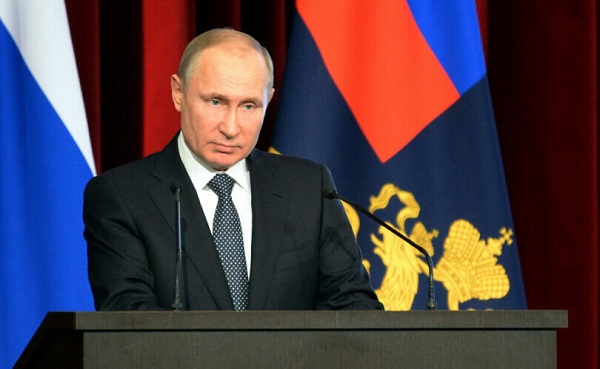conflict
Russia has sent the West a message: Don’t provoke us into escalating the war

From LifeSiteNews
The U.S., U.K., and NATO war alliance is desperate to provoke Vladimir Putin into expanded engagement prior to Donald Trump taking office. NATO members, sans Biden, met after the U.S. election to organize a strategy to Trump-proof their efforts.
Despite the diminutive Ukranian President Volodymyr Zelensky jumping around and shouting about Russians firing an Intercontinental Ballistic Missile (ICBM) Thursday, they didn’t. Instead, Russian President Vladimir Putin decided his response to the U.S-led NATO group firing missiles into the Russian Federation would be to send a message with a multi-warhead intermediate range hypersonic missile. (Click here for background information.)
President Vladimir Putin said “one of the newest Russian medium-range missile systems was tested in combat conditions, in this case with a ballistic missile in non-nuclear hypersonic edition.” The missile has a range of approximately 3,500 kilometers, below the threshold for the Strategic Arms Limitation Treaty (SALT) – that’s a reach throughout western Europe, and the hypersonic message is likely, “You have no iron dome system that can prevent this.”
From Reuters:
Russia fired a hypersonic intermediate-range ballistic missile at the city of Dnipro on Thursday in response to the U.S. and UK allowing Kyiv to strike Russian territory with advanced Western weapons, in a further escalation of the 33-month-old war.
Russian President Vladimir Putin, in a televised address, said Moscow struck a Ukrainian military facility with a new ballistic missile known as ‘Oreshnik’ (the hazel) and warned that more could follow.
‘A regional conflict in Ukraine previously provoked by the West has acquired elements of a global character,’ Putin said in an address to the nation carried by state television after 8 pm Moscow time (1700 GMT).
A U.S. official said that Washington was pre-notified by Russia shortly before its strike, while another said they had briefed Kyiv and other close allies in recent days to prepare for the possible use of such a weapon.
Regardless of its classification, the latest strike highlighted rapidly rising tensions in the past several days.
Ukraine fired U.S. and British missiles at targets inside Russia this week despite warnings by Moscow that it would see such action as a major escalation.
The U.S., U.K., and NATO war alliance is desperate to provoke Vladimir Putin into expanded engagement prior to President-elect Donald Trump taking office. The NATO members, sans Biden, previously met in Brussels after the U.S. election to organize a strategy to Trump-proof their efforts.
Increasingly it looks like Great Britain will lead the provocation effort, with full support of the U.S. war machine. We previously said to watch Moldova closely, because that strategic position would be the most likely place of Western political influence to provoke Russia.
Indeed, as things are starting to unfold with increased urgency stimulated by the U.S. election outcome, now we see the U.K. entering a new agreement for military defense of Moldova being pre-positioned. From a U.K. government press release:
A new UK-Moldova Defence and Security Partnership has also been launched today, building on extensive cooperation between the two countries and strengthening Moldovan resilience against external threats. This partnership will bolster support for the sovereignty, security and stability of Ukraine, helping to strengthen national security at home in the face of increasing Russian aggression.
…
Foreign Secretary David Lammy said:
‘Moldova is a vital security partner for the UK, which is why to reinforce their resilience against Russian aggression and to keep British streets safe, I am deepening cooperation on irregular migration and launching a new Defence and Security Partnership.
‘With Ukraine next door, Moldovans are constantly reminded of Russia’s oppression, imperialism and aggression.[‘]
As the design of the strategy appears to be unfolding, Great Britain, with U.S. covert operational support, will position themselves inside Moldova. NATO troops are already on the ground there, much to the anxiety of the average Moldovan.
The intellectually honest people of Moldova, using the reference point of prior activity by the U.S. in Ukraine, clearly see themselves being set up as cannon fodder for Western military usefulness. The Great Britain/CIA/NATO team appears likely to use the geography of Moldova to provoke Russia into some form of response.
The U.K. can then declare their troops under attack, and NATO can respond with mutual defense of the U.K. pact, via Moldova.
The baseline for the continued need to avoid any cessation of hostilities in Ukraine is financial. BlackRock and JPMorgan have exclusive rights to the “rebuilding” of Ukraine, with access to all the resources therein. Thus there is an alignment of interests between BlackRock, JPMorgan, NATO, the U.S. State Department, and the internal operatives of the Biden administration.
At the same time, the Deep State (those who control Biden), the Intelligence Community, in combination with the anti-Trump DOJ-NSD (National Security Division), are using the increased hostility to bait President-elect Trump into saying something contradictory about current U.S.-NATO policy – a Logan Act violation.
So far President Trump has remained quiet, as the provocation against our peaceful interests are ongoing. For his part, Vladimir Putin has remained reserved and careful in his response; however, as U.S./NATO missiles continue to land inside the Russian Federation, there is concern that Putin’s restrained responses may indeed escalate.
We hope there are backchannels between Moscow and Mar-a-Lago; however, without any doubt the Intelligence Community is looking to intercept any communication that might possibly be taking place. Everyone in and around the orbit of President Trump likely has national security surveillance on them.
The industrial war machine is attempting to defend itself against any peace effort.
“Troublesome” is an understatement.
Reprinted with permission from Conservative Treehouse.
Artificial Intelligence
AI Drone ‘Swarms’ Unleashed On Ukraine Battlefields, Marking New Era Of Warfare


From the Daily Caller News Foundation
Artificial intelligence-powered drones are making their first appearances on the battlefield in the Russia-Ukraine war as warfare creeps closer to full automation.
In bombardments on Russian targets in the past year, Ukrainian drones acting in concert were able to independently determine where to strike without human input.
It’s the first battlefield use of AI “swarm” technology in a real-world environment, a senior Ukrainian official and Swarmer, the company who makes the software, told the Wall Street Journal in a Tuesday report. While drones have increasingly defined modern battlefields, swarms until now had been confined to testing rather than combat.
“You set the target and the drones do the rest,” Swarmer Chief Executive Serhii Kupriienko told the WSJ. “They work together, they adapt.”
So far, the Swarmer technology has been used hundreds of times to target Russia assets, but was first used a year ago to lay mines on the front, the Ukrainian official told the WSJ. The software has been tested with up to 25 drones at once, but is usually utilized with only three.
Kupriienko told the WSJ that he was preparing to test up to 100 drones at once with the linking software.
A common arrangement used on the battlefield includes one reconnaissance drone to scout out the target and two explosive drones delivering the payload on target, the official told the WSJ.
While Western nations such as the U.S., France and the United Kingdom are also pursuing drone swarm technology, they have not deployed swarm technology on the battlefield the way Ukraine has, according to the WSJ. Currently, autonomous weapons are not regulated by any international authority or binding agreement, but ethical concerns around the technology has led many to call for increased regulation of weapons like the Swarmer system.
The Ukrainian Ministry of Foreign Affairs did not immediately respond to the Daily Caller News Foundation’s request for comment.
conflict
Trump Pentagon Reportedly Blocking Ukraine From Firing Western Missiles Deep Into Russia


From the Daily Caller News Foundation
The Department of Defense has spent months blocking the Ukrainian military from using American and British-made missiles to hit targets deep inside Russia, The Wall Street Journal reported Sunday, citing unnamed U.S. officials.
Undersecretary of Defense for Policy Eldridge Colby reportedly designed the procedure to review requests to carry out the long-range strikes with weapons that are either of U.S. origin or that require American intelligence or use components provided by the U.S., according to the WSJ. Secretary of Defense Pete Hegseth reportedly has the final say on whether Ukrainian forces can use the MGM-140 ATACMS (Army Tactical Missile System) to hit targets in Russia.
The reported blocks on missile strikes coincides with a Trump administration effort to broker a peace deal between Russia and Ukraine. A Pentagon spokesperson declined to comment further on the matter.
BREAKING: President Vladimir Putin reacts to B-2 Flyover pic.twitter.com/1mzVn7DxlW
— Jack Poso 🇺🇸 (@JackPosobiec) August 15, 2025
The Biden administration allowed Ukraine to carry out strikes with ATACMS in November, weeks after President Donald Trump won the 2024 election, the New York Times reported. Trump criticized the move during a December interview with Time magazine.
“It’s crazy what’s taking place. It’s crazy,” Trump said. “I disagree very vehemently with sending missiles hundreds of miles into Russia. Why are we doing that? We’re just escalating this war and making it worse. That should not have been allowed to be done.”
Trump and Russian President Vladimir Putin met in Alaska on Aug. 15 for a summit meeting during which Trump sought to secure a cease-fire in Russia’s war with Ukraine. As Trump greeted Putin, a B-2A Spirit stealth bomber and several fighters carried out a flyover of Elmendorf Air Force Base.
Trump met with Ukrainian President Volodymyr Zelensky and major European leaders on Aug. 18 to update them on the summit.
In July, Trump reached an agreement with NATO where members of the alliance would purchase weapons, including MIM-104 Patriot surface-to-air missiles, and donate them to Ukraine.
-

 Business14 hours ago
Business14 hours agoTrans Mountain executive says it’s time to fix the system, expand access, and think like a nation builder
-

 Alberta2 days ago
Alberta2 days agoCoutts border officers seize 77 KG of cocaine in commercial truck entering Canada – Street value of $7 Million
-

 Business2 days ago
Business2 days agoThe painful return of food inflation exposes Canada’s trade failures
-

 Alberta1 day ago
Alberta1 day agoPremier Smith sending teachers back to school and setting up classroom complexity task force
-

 Alberta23 hours ago
Alberta23 hours agoThousands of Albertans march to demand independence from Canada
-

 Addictions16 hours ago
Addictions16 hours agoThe Shaky Science Behind Harm Reduction and Pediatric Gender Medicine
-

 Business1 day ago
Business1 day agoOttawa Bought Jobs That Disappeared: Paying for Trudeau’s EV Gamble
-

 Crime23 hours ago
Crime23 hours agoSuspect caught trying to flee France after $100 million Louvre jewel robbery









